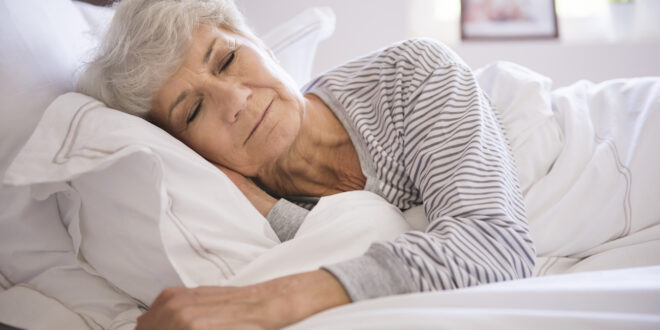Seniors get lumbered with a lot of myths, and a very common one is older people require less sleep. Wherever it came from is anyone’s guess, but it couldn’t be further from the truth. The reality, is many seniors often achieve less sleep at night than they need and would like.
A wide range of age-related factors contribute to a lack of sleep, and can include the side effects of medication, the need to go to the toilet more frequently at night, aches and pains, or conditions such as sleep apnoea. Insomnia can also impact sleep in older people, as can a lack of routine which sees seniors napping during the day. Regardless of all this, older people still require the same 7-9 hours sleep all adults need in order to stay physically and mentally healthy.
Another sleep myth which seniors shouldn’t take on board is feeling tired, all the time, during the day is normal when you’re older. In fact, if this sounds like you, then you should begin practising healthy sleep routines and/or talk to your GP. Healthy sleep routines include getting appropriate exercise, going to bed and getting up at the same time each day, avoiding napping late in the day or in the early evening, and steering clear of screens in the hour before going to bed. Eating large meals close to bedtime is also a recipe for poor sleep, as is consuming alcohol or caffeine in the evening (and remember, caffeine is found in a number of substances including chocolate, tea, and many soda drinks).
One piece of sleep information that is true, is seniors often feel sleepier earlier in the evening than younger adults, and consequently go to bed earlier and get up earlier. But even though they may be asleep during much of this time, they’re less likely than younger people to be reaching deeper phases of sleep. Achieving lighter sleep may be one of the reasons seniors can feel tired during the day, and doze off after a meal or in front of TV. The other reason of course, is the freedom retirement brings – suddenly seniors feel they can please themselves about how late they stay up, because there are no morning work demands to respond to.
If you’re looking for a sounder night’s sleep, attention to security can help, and with a few simple steps, you can achieve peace of mind before you turn out the lights. So, take care to lock external doors and windows, keep an easy-to-activate light beside your bed, along with your phone and list of emergency numbers, and a torch. Have a small bottle of water handy (a glass is easily knocked over), and any medications you may need. Turn off your electric blanket (or if using a hot water bottle, remove it) before you get into bed.
Seniors who are struggling with Alzheimer’s disease, and partners who are caring for them, may experience more challenging sleep problems than most. Some Alzheimer’s sufferers sleep too much while others don’t get enough sleep at night. They may also wake often in the night, call out, or get up and move about. If you care for someone with Alzheimer’s disease, it’s important to make your home as safe as possible so you can achieve the peace of mind that affords you the greatest opportunity for sleep. This can mean securing doors, storing medicines in locked cabinets, and keeping floors clutter-free. It’s also imperative you seek information on respite care for your loved one so you can recharge your own sleep batteries regularly.
As a senior, it’s important not to buy into the sleep myths others throw at you. You need as much sleep as every other adult, and if you’re trying to manage on less, it’s time to seek professional help.









Join the Discussion
Type out your comment here:
You must be logged in to post a comment.